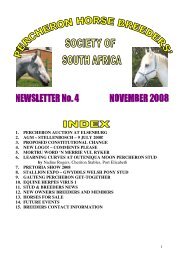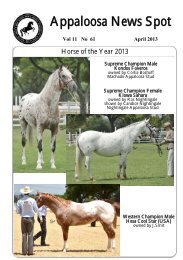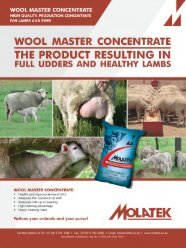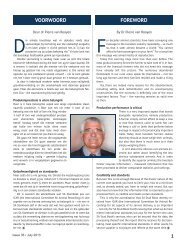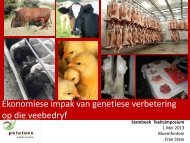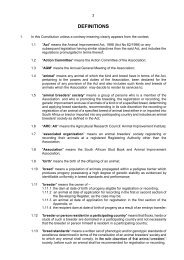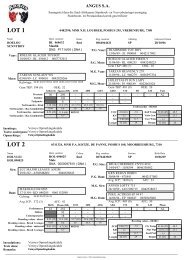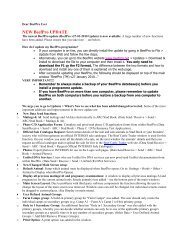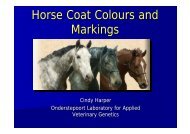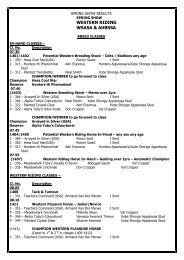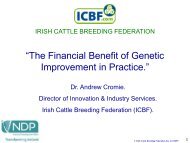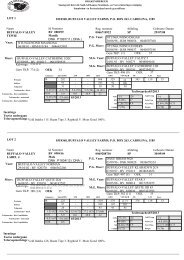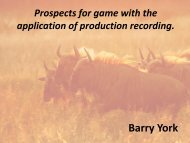Kliek hier vir bladsy 36-48 - SA Stamboek
Kliek hier vir bladsy 36-48 - SA Stamboek
Kliek hier vir bladsy 36-48 - SA Stamboek
You also want an ePaper? Increase the reach of your titles
YUMPU automatically turns print PDFs into web optimized ePapers that Google loves.
PRODUCTION RECORDS<br />
Logix Game: A structured<br />
recording system for wildlife<br />
ranching in South Africa<br />
By Dr Japie van der Westhuizen, South African Stud Book and Animal Improvement Association<br />
South Africa has a rich history of<br />
animal recording. The focus has<br />
mainly been on the recording<br />
of so-called farm animals (livestock)<br />
and was initially aimed<br />
at the keeping of stud books for different<br />
breeds. The South African Stud Book<br />
and Animal Improvement Association was<br />
founded by a group of stud breeders in<br />
1905 for this purpose.<br />
From the onset the independence of<br />
the individual breeders’ societies or groups<br />
(in terms of their respective constitutions)<br />
was recognised, but <strong>SA</strong> Stud Book is being<br />
tasked to oversee the recording of ownership,<br />
keepers and particulars of the animals<br />
of their members and to also see to it that<br />
the particular constitutions are being adhered<br />
to. As a private, non-profit association,<br />
<strong>SA</strong> Stud Book belongs to its members,<br />
the breeders’ societies (or groups). Effectively<br />
the members have direct decision<br />
powers in the services, budget and fees.<br />
<strong>SA</strong> Stud Book is registered as a registering<br />
authority under the Animal Improvement<br />
Act (Act 62 of 1998). A total of 63 registered<br />
animal breeders’ societies are members of<br />
<strong>SA</strong> Stud Book, plus an additional 25 direct<br />
entry breeds (breeds without a society), all<br />
making use of the services rendered by<br />
<strong>SA</strong> Stud Book.<br />
Why record?<br />
Not only due to the commercialisation of<br />
wildlife, but also for many other important<br />
reasons, the recording of individual animals,<br />
ownership (and locality), pedigree (if<br />
known), physical characteristics, measurements<br />
or scored traits, animal events (such<br />
as births, time and locality of handling,<br />
blood, tissue or semen samples, DNA evaluation,<br />
measurements and weights, transfers<br />
Figure 1: Pathways for data submission, uptake, calculation and reporting for wildlife.<br />
of ownerships, matings, etc.) and other species-specific<br />
needs, are all main considerations<br />
for any commercial enterprise. This is<br />
therefore as important for game management<br />
as for breeding or farming with any<br />
other farm animal.<br />
The mere recording of lineage (parentage<br />
linked to origin) and ownership (also locality)<br />
have many advantages, namely:<br />
• Calculation of species (breed) structures<br />
where prominence and influence<br />
of breeders, lines and origins can be<br />
quantified.<br />
• General demographics can be quantified.<br />
• Bottlenecks in the breeding structure<br />
can be identified and addressed.<br />
• Average and specific genetic relationships<br />
can be calculated and used for<br />
inbreeding calculations and the prevention<br />
of matings that can lead to<br />
inbreeding depression.<br />
The real advantages, however, are to extend<br />
recording functions to include additional<br />
information of economic value that<br />
will be beneficial to wildlife ranchers, can<br />
contribute to identifying superior breeding<br />
stock and can assist in research and a wider<br />
understanding of the particular species.<br />
For this purpose recordings on Logix, a centralised<br />
generally accessible database, is<br />
essential as each animal’s particulars with<br />
regards to the following will be known and<br />
can be used in a wider context of actions<br />
related to profit:<br />
• Any event of significance in the animal’s<br />
life, such as:<br />
Issue 35 ▪ July 2013<br />
43



